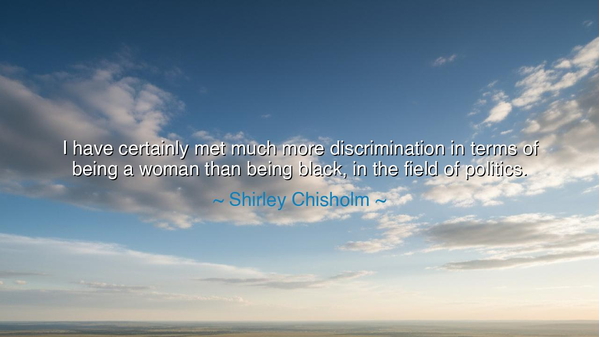
I have certainly met much more discrimination in terms of being
I have certainly met much more discrimination in terms of being a woman than being black, in the field of politics.






Hear now the voice of a pioneer, a woman who walked where few dared tread, and who spoke truth even when truth burned like fire in her mouth. Shirley Chisholm, the first Black woman elected to the United States Congress, declared with courage: “I have certainly met much more discrimination in terms of being a woman than being black, in the field of politics.” These words are not merely confession, they are revelation. They speak of the double battle, the double burden, that history has often placed upon women—burden of color, burden of gender—and of the strange truth that even in a world scarred by racial division, the walls built against women’s power stood taller still.
The origin of her statement lies in the battlefield of politics, a place where power is negotiated not only through laws and policies, but through unseen barriers of prejudice and tradition. Chisholm, a daughter of Barbadian and Guyanese immigrants, rose not by chance, but by sheer defiance of those barriers. When she entered Congress in 1968, she stood as a symbol of two struggles—race and gender. Yet she found that while men could sometimes be swayed to look past the color of her skin, they were far less ready to accept that a woman could wield the scepter of power with the same strength and vision as a man.
Think, then, of the courage it took for her to run for President of the United States in 1972. Her campaign was not lavish, her resources few, yet her vision was mighty. She was met not only with skepticism from white men, but also from Black men who could not yet envision leadership draped in a woman’s form. The enemy she faced was not only racism, but the deeper, older force of sexism, a chain forged through millennia of silencing voices, confining talents, and dismissing wisdom that flowed from the lips of women.
Her struggle echoes the story of Joan of Arc, the peasant girl who led armies with divine fire. Joan too was doubted, not because of the purity of her mission, but because she bore the form of a woman. She shattered armies but could not shatter the prejudice of her time, and so she was burned as a heretic. Centuries apart, Joan and Shirley stand as mirrors: warriors of spirit, dismissed not for their lack of vision or courage, but for the shape of their bodies and the voices they carried.
And yet, O listener, from their trials we see a greater truth: prejudice is not only a foe to be defeated, it is a measure of the strength of the one who endures it. For what greater heroism is there than to walk into a battlefield knowing that arrows will fly not only from the enemy, but from those who should have been allies? Chisholm herself said she entered politics as “unbought and unbossed.” She could not be tamed, and so her struggle bore fruit—not for herself alone, but for generations who would follow her path.
The lesson for us is clear: in every age, there are those who face discrimination, whether for race, gender, class, or creed. But the struggle of Shirley Chisholm teaches us that some barriers are hidden beneath layers of tradition and habit, making them harder to expose, harder to break. We must therefore become vigilant, questioning not only the obvious chains but also the invisible ones.
And what action shall we take? First, we must listen to voices long ignored. Give space for women, for the marginalized, for those who have been silenced not by lack of wisdom but by lack of opportunity. Second, we must act where we stand: in our workplaces, our communities, even in our families, we must call out injustice and break the habit of dismissing leadership because it comes in unexpected forms. Third, let us honor those like Shirley Chisholm by building upon their labor, refusing to accept a world where equality is promised but not practiced.
So let these words endure: being a woman is not a weakness, it is not a barrier, it is not a burden. It is a source of strength, wisdom, and vision, as mighty as any other. And when the day comes that the world recognizes this truth fully, the chains that bind half of humanity will shatter, and we shall all walk freer beneath the sun.






AAdministratorAdministrator
Welcome, honored guests. Please leave a comment, we will respond soon